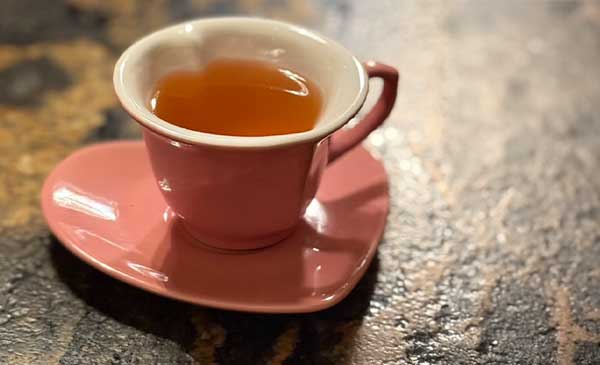Heart-Healthy Tea: A Daily Ritual for Wellness

Tea isn’t just a cozy beverage for cold mornings or a soothing sip in the afternoon. It’s also one of the world’s most researched and revered drinks for cardiovascular health.
For centuries, men and women around the globe have turned to tea not only for its comforting flavors, but also for its medicinal properties. Modern science is now confirming what ancient traditions long suspected: certain teas may help protect your heart, support healthy blood pressure, and improve circulation.
In this article, we’ll explore the connection between drinking tea and heart health, the best types of heart-healthy teas, and how to easily make tea part of your daily wellness routine.

Why Tea Is Good for Your Heart
The link between tea and cardiovascular health largely comes down to its antioxidant content. Most teas—particularly green, black, white, and certain herbal infusions—are rich in polyphenols. These compounds help combat oxidative stress, which can damage blood vessels and contribute to plaque buildup.
Here are some key ways tea supports your heart:
1. Improved Blood Vessel Function
Polyphenols, especially catechins in green tea, may help improve endothelial function (the health of the cells lining your blood vessels). When your blood vessels are flexible and responsive, your blood flows more easily, reducing strain on the heart.
2. Cholesterol Management
Several studies have shown that tea consumption—particularly green and black tea—may lower LDL cholesterol ("bad") levels and increase HDL cholesterol ("good") . Lowering LDL is a key factor in reducing arterial plaque formation.
3. Healthy Blood Pressure
Tea’s antioxidant compounds and gentle caffeine content can help promote healthy circulation. Regular consumption has been linked to modest reductions in both systolic and diastolic blood pressure.
4. Reduced Risk of Heart Attack and Stroke
Long-term tea drinkers often have a lower risk of cardiovascular events. A study published in China found that habitual tea drinkers had a 20% lower risk of heart disease and stroke compared to non-drinkers.

The Best Teas for Heart Health
While almost all types of tea provide some cardiovascular benefits, some varieties shine brighter for heart wellness.
Green Tea
- Why it’s great: Rich in EGCG (epigallocatechin gallate), one of the most powerful catechins for cardiovascular support.
- Benefits: May improve cholesterol profiles, enhance blood vessel health, and reduce inflammation.
- Flavor profile: Light, grassy, slightly sweet.
- Example: Sencha, Dragonwell (Longjing), or matcha for a more concentrated source of antioxidants.
Black Tea
- Why it’s great: Packed with theaflavins and thearubigins, which have been shown to support healthy cholesterol levels.
- Benefits: May help lower blood pressure and improve circulation. (Find out how black tea also may help digestion!)
- Flavor profile: Bold, malty, or brisk.
- Example: Assam, Keemun, or Ceylon.
Oolong Tea
- Why it’s great: Contains a mix of catechins (like green tea) and theaflavins (like black tea), offering the best of both worlds.
- Benefits: Linked to reduced cholesterol and improved heart health markers.
- Flavor profile: Ranges from floral and creamy to roasted and nutty.
- Example: Darjeeling Oolong or Jade Oolong
White Tea
- Why it’s great: The least processed of all teas, white tea retains a delicate but potent antioxidant profile.
- Benefits: May reduce inflammation and support healthy blood pressure.
- Flavor profile: Subtle, sweet, and delicate.
- Example: Silver Needle or White Peony.
Hibiscus Tea (Herbal)
- Why it’s great: Caffeine-free and high in anthocyanins, hibiscus tea is well known for lowering blood pressure.
- Benefits: Several studies have shown measurable reductions in hypertension with daily hibiscus tea consumption.
- Flavor profile: Tart, cranberry-like.
- Note: If you’re on blood pressure medication, consult your doctor before adding hibiscus regularly.
Rooibos Tea (Herbal)
- Why it’s great: Contains aspalathin, an antioxidant linked to vascular health.
- Benefits: May help reduce oxidative stress and support heart function.
- Flavor profile: Naturally sweet, slightly nutty.
- Caffeine: None—great for evening.

How to Incorporate Heart-Healthy Tea into Your Daily Routine
The best way to enjoy tea’s cardiovascular benefits is through consistency. A single cup here and there won’t move the needle much—but making tea a daily ritual can. Aim for 2–4 cups of tea a day, depending on your caffeine sensitivity.
Here are some ways to make tea a natural part of your day:
1. Start Your Morning with Tea Instead of Coffee
- Swap your usual coffee for a cup of green or black tea. You’ll still get a gentle caffeine boost without the jitters, and your heart will thank you for the extra antioxidants.
- If you can’t give up coffee completely, try alternating days or making your first cup of the day tea-based.
Pro tip: Matcha lattes are an energizing way to start the morning with heart-friendly EGCG.
2. Create an Afternoon Tea Break
- Instead of reaching for a sugary snack, brew a cup of tea in the afternoon. Black tea can provide a steady energy lift, while oolong offers a smooth pick-me-up without a crash.
- Pair it with heart-healthy snacks like raw almonds, apple slices, or a small piece of dark chocolate.
Pro tip: Keep a small tea infuser or sachets at your desk so you can steep tea at work.
3. Add Herbal Teas Before Bed
- Evening is a perfect time for caffeine-free teas like rooibos or hibiscus. You’ll wind down while still supporting cardiovascular health.
- Drinking tea in the evening can also help replace high-calorie drinks like soda or wine.
Pro tip: Make a pot of herbal tea and keep it warm in a thermos while you relax.
4. Try Cold Brew Tea for a Refreshing Twist
- Cold brewing tea reduces bitterness and produces a smooth, naturally sweet flavor. Ideal for staying hydrated in summer and equally good for heart health.
- Fill a pitcher with filtered water, add loose leaf tea (green, white, or hibiscus work well), and steep in the fridge for 6–12 hours.
Pro tip: Keep a large bottle of cold-brew tea in the fridge for easy sipping throughout the day.
5. Combine Tea with Other Heart-Healthy Habits
- Pair your tea ritual with a short walk, meditation, or stretching to create a habit loop that supports overall cardiovascular wellness.
- Consider replacing at least one sugary beverage per day with tea to reduce empty calorie intake and improve heart health.

Frequently Asked Questions About Tea and Heart Health
Q: What is the recommended tea intake for heart health?
Most studies suggest that 2–4 cups daily is an effective range. Drinking tea consistently over months and years yields the best results.
Q: Does tea benefit heart health more than coffee?
Both tea and coffee offer health benefits, but tea contains higher amounts of certain antioxidants (catechins, theaflavins) that are specifically linked to cardiovascular wellness. Tea is also less likely to cause rapid spikes in blood pressure for those sensitive to caffeine.
Q: Is it safe for me to drink tea with hypertension?
Yes, but opt for moderate caffeine intake and consider herbal teas like hibiscus, which may help lower blood pressure. Always consult your doctor if you’re on medication.
Q: Does adding milk reduce tea’s heart benefits?
Some research suggests milk proteins may bind to tea’s antioxidants, reducing their bioavailability—but the evidence is mixed. If you enjoy milk in your tea, you’re still getting many of the benefits.
Final Thoughts
Making tea a daily habit is a simple, enjoyable way to support your heart health. From the EGCG-rich sip of green tea in the morning to the blood-pressure-lowering tang of hibiscus tea at night, your teacup can be a powerful ally in cardiovascular wellness.
The key is consistency—integrating tea into your routine so it becomes as natural as brushing your teeth. With so many varieties to explore, you’ll not only nurture your heart but also expand your palate and enjoy a daily moment of calm.
Your heart works tirelessly for you every day. Pour yourself a cup of something that works just as hard in return.
Please note: This article is for informational purposes only and is not a substitute for professional medical advice. Always consult your qualified health care provider before making significant changes to your diet, especially if you have existing heart conditions or are taking medication.






